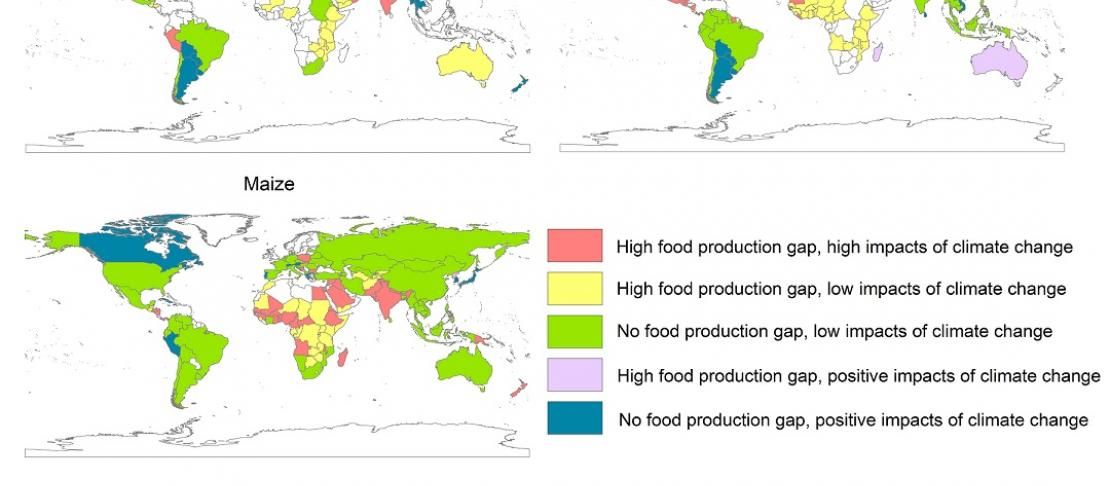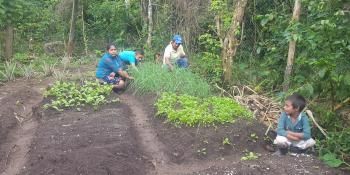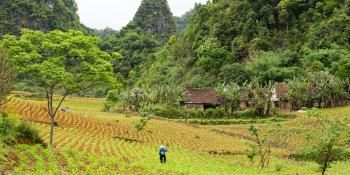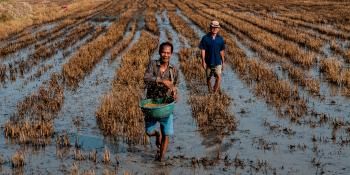Will climate change make us go hungry by 2050?

Results of recent research conducted by the CGIAR Research Program on Climate Change, Agriculture and Food Security (CCAFS) show high impacts of climate change on the productivity of rice, wheat, and maize by 2050. Most of Africa, South Asia and Central Asia, along with temperate countries in South America and Scandinavia, were found to be vulnerable due to both food production gaps and the projected negative impacts of climate change.
Many research studies have been carried out to quantify projected climate impacts on agriculture at diverse spatial scales, using various climate and crop models. A recent publication by CCAFS researchers has comprehensively summarized this large body of work, focusing on the most consumed cereals globally (wheat, rice, and maize), with important takeaways for food security. Analyzing more than 150 studies published since the 1980s, the authors highlight high negative impacts of climate change on the productivity of these three staple crops, with area-weighted global losses reaching up to -12% for wheat, -15% for rice, and -20% for maize by the 2080s. These disturbing findings should be enough to rally the world to move towards adaptive measures. Philip Thornton, principal scientist at International Livestock Research Institute (ILRI) and co-author of the paper explains this research saying “This is the first country-level meta-analysis of a very large body of work going back to the 1980s that has identified trends in projected crop yield impacts through time. Another interesting aspect of the study is the link with possible future cereal demand arising from human population growth, enabling us to identify countries that may be particularly at risk from climate change.”
The research identified global hotspots of potential food insecurity, by analyzing projected future food demand for the 2050s together with national food supply. These hotspots included most of Africa, South Asia and Central Asia, along with temperate countries in South America and Scandinavia, which were found to be vulnerable due to both food production gaps and the projected negative impacts of climate change. “These regions have immense food security problems. They have a two-fold crisis: a) their growth rate of food production already lags behind the projected demand and b) future climate change will further disrupt their food supply,” elaborated Pramod Aggarwal, lead author and South Asia Regional Program Leader for CCAFS, based at BISA CIMMYT.
Impact assessments on agriculture underline the considerable potential of adaptation for addressing the negative effects of climate change. Adaptive measures such as changes to planting dates, cultivating improved varieties, and increased nutrient and water application, are known to dramatically decrease the negative impacts of climate change. If adaptive measures are employed, projected net reductions in productivity by 2080 are considerably smaller: -6% for rice, -4% for wheat, and -13% for maize. Adaptation could help to level the playing field for the tropics and developing regions, by equalizing the impacts from climate change across different regions.
The catch? These processes can be challenging to implement, and come with a cost. Co-author and CCAFS Program Director Bruce Campbell warns, “These adaptation strategies are constrained by the economic, institutional and ecological costs involved. Massive science-guided investments and policy support are required to scale-out adaptation globally. Pathways to sustainable development like climate-smart agriculture may prove to be a more viable alternative than intensive agricultural practices.”
About CCAFS:
The CGIAR Research Program on Climate Change, Agriculture and Food Security (CCAFS), led by the International Center for Tropical Agriculture (CIAT), brings together some of the world’s best researchers in agricultural science, development research, climate science and Earth system science, to identify and address the most important interactions, synergies and tradeoffs between climate change, agriculture and food security. www.ccafs.cgiar.org.
CCAFS is carried out with support from the CGIAR Trust Fund and through bilateral funding agreements. For details please visit https://ccafs.cgiar.org/donors.
About CGIAR:
CGIAR is a global agriculture research partnership for a food secure future. Its research is carried out by 15 CGIAR Centers in close collaboration with hundreds of partner organizations. www.cgiar.org.
About BISA CIMMYT:
The Borlaug Institute for South Asia (BISA) is a non-profit international research institute dedicated to food, nutrition and livelihood security as well as environmental rehabilitation in South Asia, which is home to more than 300 million undernourished people. BISA is a collaborative effort involving the International Maize and Wheat Improvement Center (CIMMYT) and the Indian Council for Agricultural Research (ICAR). The objective of BISA is to harness the latest technology in agriculture to improve farm productivity and sustainably meet the demands of the future.
Article link: https://doi.org/10.1088/1748-9326/aafa3e
For further information, please contact: Sakshi Saini (PhD), sa.saini@cgiar.org or +91 9899058009


